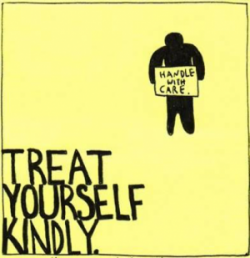Resilience During the Pandemic

El otro lado de la moneda
March 23, 2020
In the Midst of Our Shared Vulnerability
April 1, 2020Shared with approval from Nick Arnett & Janet Childs
Bay Area Critical Incident Stress Management Team
Fear, worry, and anxiety are natural responses to threats, especially when reliable information is scarce, and uncertainty is high. If you are finding it hard to believe that current events are really happening, like you are living in a movie, know that you are not alone. Nearly everyone, even medical disaster professionals, are feeling that way some of the time – “Is this really happening?”
- Choose your information sources. Information is helpful, but don’t listen to everyone. Rumors will continue, which can add to your worries as you wonder what to believe. Decide which sources you are going to trust. Although the Internet spreads rumors and gossip, it also allows you to connect directly with sources of authoritative information. Turning off or ignoring unreliable sources may be difficult because it is normal to hunger for information when stressed, but it is a smart strategy, especially with children, who especially need calm facts.
- Changing habits is hard; start small and start over. As we adapt to a new normal, aspects of our lives have changed dramatically, calling us to do our work, shopping, socializing and other activities differently. Changing habits is simple, but not easy. Rather than telling yourself or other people “You should…,” convert the idea into something positive. For example, “I am choosing to do X so that I feel more energy, stay healthy and help my neighbors.” Be gentle with yourself. Recognize that all change is stressful, but not necessarily bad for you.

- Like the stress of safe weightlifting becomes strength when combined with rest and protein, all kinds of stress can contribute to your strength when you also get the physical, social, and spiritual care and nourishment you need, as described below. Your “fight or flight” reactions, combined with recovery responses, turns stress into strength.
- You are having a normal reaction if the stress of this pandemic is aggravating or triggering past trauma. Everyone carries a “backpack” of trauma; sudden, big changes and uncertainty can cause you to notice and feel the weight of old injuries much more than before the world changed. People are likely to become grumpier and more irritable as the pandemic continues. Be patient with yourself and others. Take breaks; taking a moment for a deep breath is powerful. Unpack your stress backpack by talking about how you are reacting to the pandemic with someone supportive, who will keep your conversation confidential. Be that safe person for others to talk to. Writing in a journal can also help.
To help get through this difficult time, take actions that re-connect you physically, socially, and spiritually:
- Physical strength and resilience come from your connections to the material world, including your body – rest, sleep, diet, exercise, finances, and possessions. We are facing much uncertainty about our physical well-being – especially health and income. Along with great attention to hygiene, this is a time to eat as well as you can, exercise regularly, and get enough sleep. Don’t try to make big changes all at once; small ones while giving yourself permission to start over, as many times as you need, is the best way to develop long-lasting resilience routines. Deep breathing, progressive muscle relaxation, yoga, Pilates, Tai Chi and other physical self-awareness and relaxation techniques are shortcuts to trigger your physical “rest and digest” recovery reactions, which let your brain and body recover, rebuild, and grow.
- Mental strength and resilience come from your connections to people – family, friends, mentors, coaches, students, and the rest of your social network, especially those you see in person. Although “social distancing” is adding challenges, working from home may bring you closer to family. Walking for exercise creates opportunities to get to know neighbors, even when you limit yourself to a hygienic distance. Sharing meals, playing games and other group activities help. Be inspired by videos of people in Italy singing together! Simply being “real” with others about how worrisome or frightening the pandemic is will go a long way toward calming everyone’s reactions. We are wired to be reassured by knowing that we’re not the only ones. Pets, especially dogs and horses, can also be quite comforting. To support others, be more like them – just be present, acknowledging emotions without trying to fix or change reactions. Social connection triggers your social “tend and befriend” recovery response, helping you know you aren’t alone. Caring creates resilience.
- Spiritual strength and resilience come from having a strong sense of meaning and purpose – knowing, living, and sharing values that surpass self-interest. Your beliefs change the way you interpret your life; they are a source of comfort and give you a sense of greater control. Take time to consider your priorities and why you choose them. Have as much compassion for yourself as you probably do for others – we are often much harder on ourselves. Spiritual connection triggers your “pause and plan” recovery response, helping you see the bigger picture and choose when to avoid black-and-white, stress-driven thinking.
 Gratitude and generosity are rocket fuel for strength and resilience. The “autopilot” in your brain that reacts to threats isn’t logical; it “learns” about danger and safety through experiences. You can help deactivate your autopilot by doing things that show it that you have what you need. Show it there’s no need for despair by finding things to be grateful for. Generosity shows your autopilot that you have enough for yourself and others.
Gratitude and generosity are rocket fuel for strength and resilience. The “autopilot” in your brain that reacts to threats isn’t logical; it “learns” about danger and safety through experiences. You can help deactivate your autopilot by doing things that show it that you have what you need. Show it there’s no need for despair by finding things to be grateful for. Generosity shows your autopilot that you have enough for yourself and others.
Resilient people are often described as “realistic optimists.” Realism means accepting what’s going on rather than denying its seriousness. Optimism means holding onto hope, even when the going is tough. Staying connected, physically, socially, and spiritually, with generosity and gratitude will help quiet your brain’s automatic stress response, while activating the equally powerful recovery responses that bring healing and growth.



